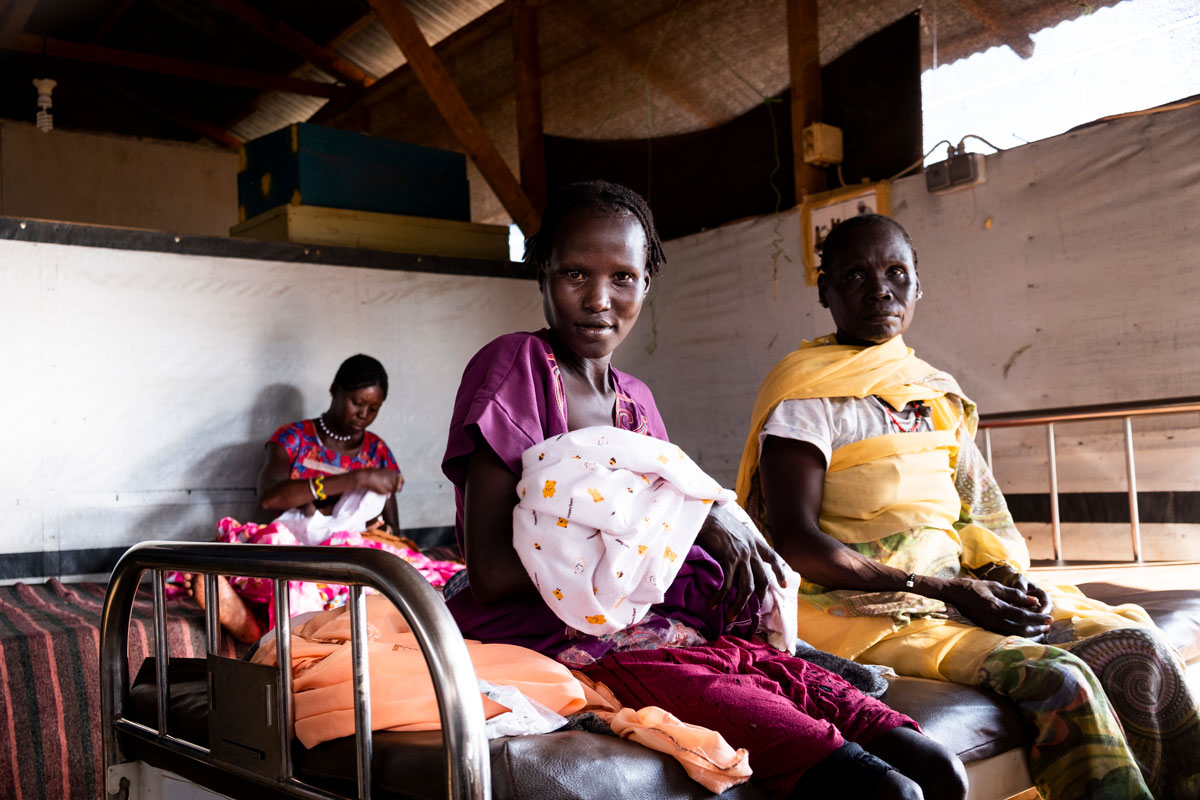Nafisa holds her day-old baby girl, Fadna, and encourages her to nurse. Through the open doorway a few hundred feet away, an expectant mother has just entered the delivery room with a midwife on her heels. Despite all the activity in Gentil Hospital’s six-bed maternity ward, the space is calm and surprisingly quiet — no babies crying, no idle chatter, no shouts from the delivery room.
Nafisa is a refugee that fled conflict in Sudan’s Blue Nile state and is now living across the border in South Sudan’s Maban County. She walked to the hospital from her home in the nearby Batil camp for her delivery.
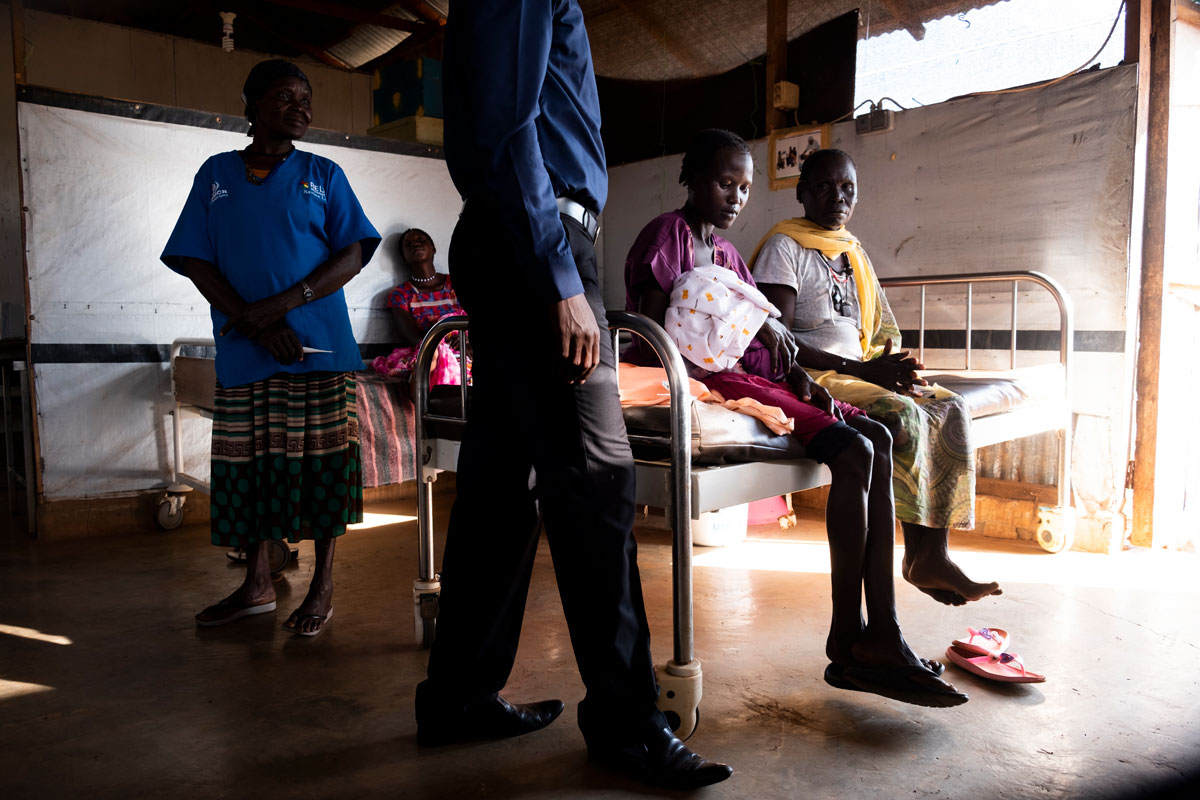
Assistant midwife Banana Adut and Dr. Jame Patrick chat with Nafisa and her mother, Sukar. Dr. Patrick is one of three doctors that rotate shifts at Gentil Hospital, the only 24/7 facility that has a doctor onsite and is walking distance for 87,000 refugees.
© Elie Gardner/RI
She appears relaxed and confident as she holds her newborn. It’s more than 90 degrees outside and the sun is blazing, making the air in the room hot and still. Nafisa’s only movement is to gently fan a thin cotton blanket back and forth to shoo flies away from herself and Fadna. There’s no running water or electricity in the maternity ward, but a bright blue, covered tub of clean water is on a table nearby to quench patients’ thirst.
Fadna is Nafisa’s sixth child. Three were born in Sudan, and three have now been born at Gentil Hospital. Nafisa says her decision to give birth at the hospital was simple: “The services I get here are good.”
Quality, Accessible Care Saves Mothers’ Lives
Midwife Betty Guo delivered the three babies currently in the ward, including Fadna, and will be the one to deliver the baby whose mother just entered the facility when the time comes. She’s just 26 years old, and the four years she’s been working as a midwife have given her a lot of hands-on experience. On her busiest days, she delivers six to eight babies.
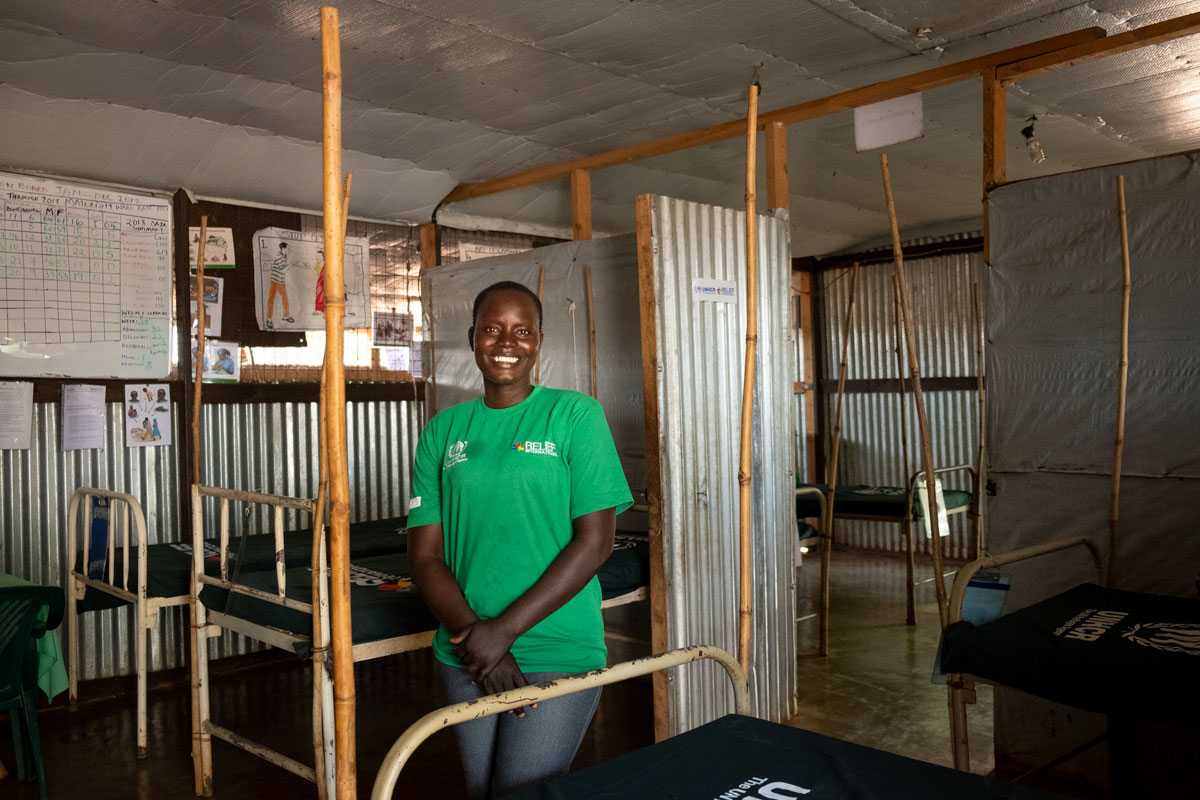
Midwife Betty Guo.
© Elie Gardner/RI
South Sudan has one of the world’s highest rates of women dying during childbirth. Most of the causes of maternal death can be prevented through antenatal care, which Nafisa received at the Batil Central Clinic that Relief International operates within the camp, as well as education on possible pregnancy-related complications and how to respond to them. The final critical factor is delivering under the care of a skilled birth attendant such as a midwife, nurse, or doctor.
Relief International began providing medical care at Gentil Hospital in 2016. Since then, no mothers’ lives have been lost during childbirth.
I choose to be a midwife because women are dying during deliveries and I need to reduce that."
The quality of care is one of many notable things about Gentil, which serves 87,000 refugees like Nafisa living in the Gendrassa, Yusuf Batil and Kaya refugee camps as well as thousands more people from nearby host communities. The hospital’s name is a merger of the areas it sits between, Gendrassa and Batil, and is a metaphor for so much more.
In a region where refugees outnumber host community members 2:1 and have frequent confrontations over limited resources, this health facility is a safe space with services available to all. It’s also the only place with a doctor on staff that’s within walking distance for refugees – and even at that, it’s a multi-hour walk for many.
“What makes Gentil unique is that it’s open 24/7 and has in-patient care. It’s also rare for any facility to comfortably serve refugees and the host community. The only other alternative is Maban Hospital, which refugees view as intended to serve only the host community.” – David Mwita, Relief International’s Maban Area Manager.
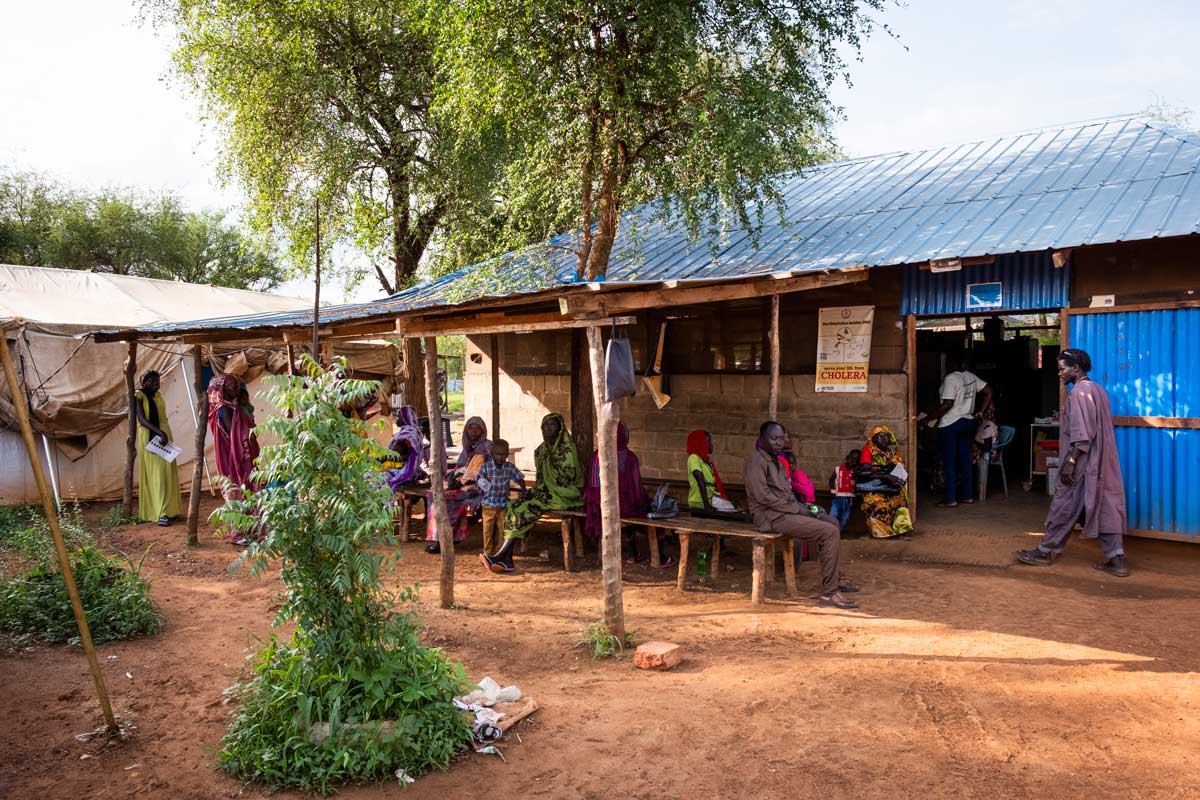
The patient check-in and waiting area at Gentil Hospital.
© Elie Gardner/RI
Gentil handles approximately 150 consults per day. The most common issues that land patients in the emergency room result from malaria and pneumonia. There’s a vaccination center as well as a laboratory that runs blood tests for pregnancy and disease. A pharmacy is housed in two shipping containers, with refrigerators storing vaccines and floor-to-ceiling shelving stocked with extensive supplies of the most-distributed medicines: paracetamol, malaria treatment, and antibiotics for lower respiratory track infections.
There’s an echo of patients’ coughing throughout the hospital campus, and the sounds continue in the pediatric ward and stabilization center for malnourished children. The stabilization center is meeting a particularly pressing need for refugee families; all are living off of rations, and food security is an ever-present threat. More than 30 children are currently being admitted each month with medical complications such as dehydration and infection resulting from severe malnutrition.
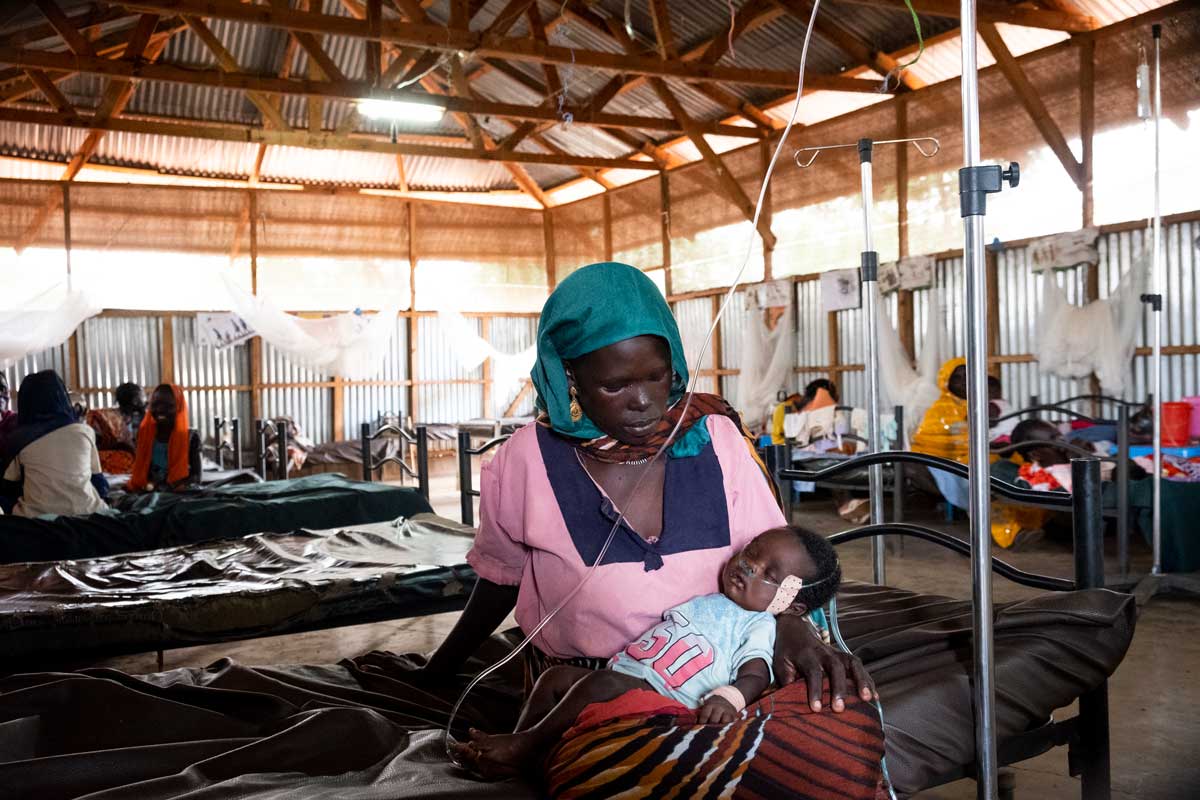
Jamila holds 5-week-old baby Toma while he receives treatment for malnutrition in the Gentil Hospital stabilization center.
© Elie Gardner/RI
Planting Paths to Better Health at Patient’s Homes
But these children’s care does not end on the hospital grounds. Relief International’s holistic programming is designed to ensure that the hundreds of children we treat each year do not regress once they’re released. After discharge, mothers of malnourished children visit our nearby Batil Agri-nutrition Center to learn about growing healthy food. Biweekly classes teach the benefits of different vegetables, followed by cooking demonstrations on ways to prepare food and retain the most nutrients.
These mothers’ newfound knowledge will be put to use in the months that follow, when the “kitchen gardens” we help them plant outside their homes are ready to harvest. These small, climate-smart plots are densely planted and designed to need minimal water.
“I am growing a garden to feed my family, and am so happy to see the food coming,” says 22-year-old Katoma Lamar, pointing to the dozens of little sprouts poking up from the dirt outside her home in Batil camp. Her 2-year-old daughter, Susan, was treated for severe malnutrition in Gentil’s stabilization center just a few months ago.
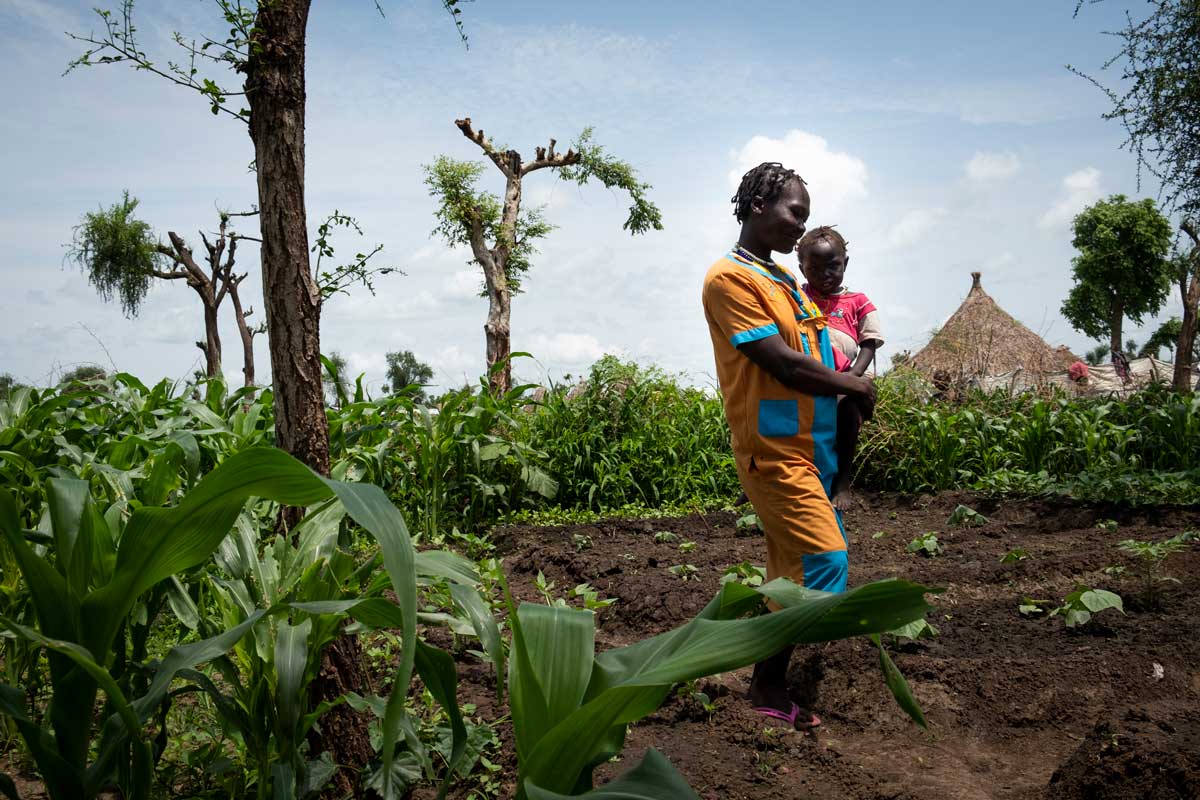
Katoma and 2-year-old Susan take stock of the growth in the "kitchen garden" garden Relief International helped her plant to combat malnutrition.
© Elie Gardner/RI
It’s the first garden Katoma has ever had, and she beams as she surveys her thriving patches of tomatoes, cucumber, rocket, eggplant, okra, and cow peas. Susan has not had to be re-admitted to the stabilization center, and Katoma is hopeful that the bounty will sustain her family’s food needs – leaving trips to Gentil Hospital for only preventative care and well-child checkups.
Since January 2019, Relief International has planted 205 gardens alongside refugee and host community families with children suffering from severe malnutrition in South Sudan. Two hundred more will be planted by the end of the year, equipping parents to fight relapse and find a reliable means to meet their food needs and secure a healthier future for their children.
